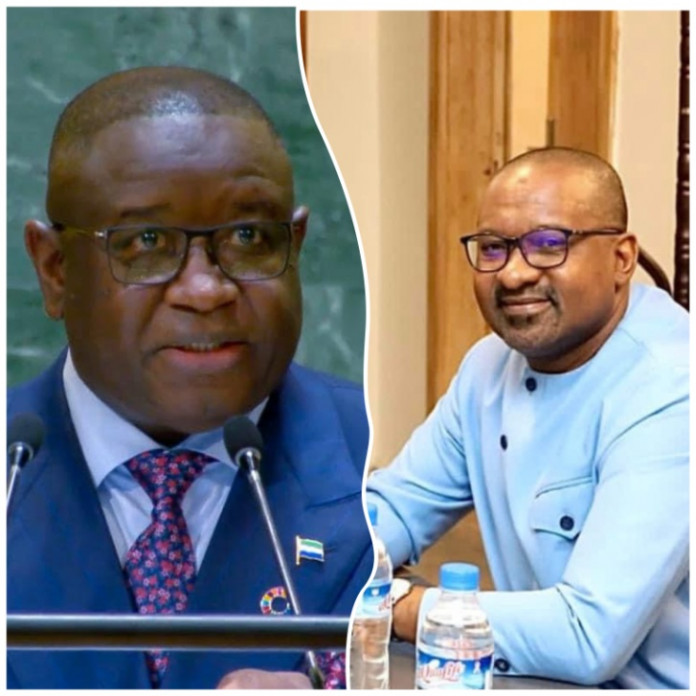By Amin Kef (Ranger)
NP (SL) Limited, Sierra Leone’s leading petroleum importer and marketer, continues to demonstrate its commitment to excellence in customer service, operational efficiency and corporate social responsibility. This week, the company reaffirmed its dedication to community development by donating essential school materials to the Children Academic Investment Foundation (CAIF) at its Terminal in Kissy, Freetown. The gesture underscores NP’s focus on improving education for underprivileged children, a key element of its corporate social responsibility (CSR) agenda.
The donation ceremony was graced by NP SL’s Communication Manager, Dr. Williette James and Hon. Princess Daramy, the Member of Parliament for the Kissy Dockyard community. Handing over the materials on behalf of NP (SL), Dr. Williette James praised CAIF’s efforts to support the less privileged and highlighted the company’s enthusiasm in contributing to the Foundation’s mission. “The work CAIF is doing is nothing short of admirable and we felt it was necessary to support this noble cause that uplifts children in our communities,” she remarked.
The donation included essential school materials such as books, pencils, erasers and school bags, benefitting 50 disadvantaged and homeless children.
Sayoh Sesay, Chairman of CAIF, expressed deep gratitude to NP (SL), stating that the company is the first major sponsor to provide such extensive support to the Foundation. “This is a landmark moment for CAIF. Since our establishment in 2019, NP (SL) is the first company to extend this level of assistance to the children we serve. We are extremely grateful,” he said.
Jeremiah Mansaray, Secretary of the Community Development Action Plan (CDAP), also applauded the gesture, noting the timeliness of the donation, which came on the first day of the school reopening. He emphasized how much the educational supplies would help alleviate the burden on families in the community.
The event also saw the participation of Councilor Sarah Amara and other local stakeholders, all of whom praised NP (SL)’s commitment to giving back to the community, particularly through educational support.
This latest donation to CAIF highlights NP (SL)’s longstanding commitment to corporate social responsibility. The company has long recognized the importance of supporting education as a means of fostering community growth and reducing disparities in access to educational resources. By providing these school materials, NP (SL) is directly contributing to the future of the children in Kissy and beyond.
NP (SL) has solidified its reputation not only as a leader in the petroleum industry but also as a beacon of success in Sierra Leone’s business landscape. The company’s “customer-first” philosophy has driven its operations, allowing it to become a trusted name in fuel supply, both domestically and regionally.
As a wholly Sierra Leonean-owned company, NP (SL)’s roots date back to its founding by 35 former employees of British Petroleum (BP), who pooled their resources to create a successful indigenous enterprise. Today, the company operates not only in Sierra Leone but also in Liberia, Guinea, Ivory Coast and The Gambia, contributing to job creation and economic growth across West Africa.
NP (SL)’s contributions extend beyond the petroleum sector. The company has diversified its offerings to include NP Gas, a popular line of gas cookers that provide a safer and more affordable alternative to traditional cooking fuels. This expansion into household products reflects NP (SL)’s broader vision of improving the quality of life for Sierra Leoneans.
NP (SL) is also at the forefront of technological innovation in the industry. Recently, the company introduced mobile fuel tanks equipped with state-of-the-art safety features, including explosion-proof technology and real-time fuel tracking systems. These tanks provide businesses with on-the-go fuel services and have been deployed to support the Sierra Leone Police Force, ensuring that law enforcement vehicles remain operational at all times.
Additionally, NP (SL)’s introduction of the NP Energy Pass, a smart card for cashless fuel transactions, marks a significant advancement in customer convenience. With features such as SMS notifications and a One-Time Password (OTP) recovery system, the NP Energy Pass allows for secure and hassle-free fuel purchases at any NP station.
As NP (SL) continues to grow, it remains committed to its role as a driver of economic development in Sierra Leone and beyond. The company’s adherence to Sierra Leone’s Local Content Policy, which ensures that nearly all of its employees are Sierra Leoneans, further solidifies its position as a champion of local empowerment.
NP (SL)’s ongoing initiatives, such as the donation to CAIF, are a testament to its dedication to making a lasting impact on the communities it serves. Through its innovative products, technological advancements and CSR activities, NP (SL) continues to set the benchmark for excellence in Sierra Leone’s business landscape.













